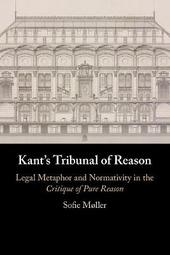
|
Kant's Tribunal of Reason: Legal Metaphor and Normativity in the Critique of Pure Reason
Paperback / softback
Main Details
| Title |
Kant's Tribunal of Reason: Legal Metaphor and Normativity in the Critique of Pure Reason
|
| Authors and Contributors |
By (author) Sofie Moller
|
| Physical Properties |
| Format:Paperback / softback | | Pages:210 | | Dimensions(mm): Height 228,Width 150 |
|
| Category/Genre | Ethics and moral philosophy |
|---|
| ISBN/Barcode |
9781108724050
|
| Classifications | Dewey:121 |
|---|
| Audience | | Postgraduate, Research & Scholarly | | Professional & Vocational | |
|---|
| Illustrations |
Worked examples or Exercises
|
|
Publishing Details |
| Publisher |
Cambridge University Press
|
| Imprint |
Cambridge University Press
|
| Publication Date |
23 December 2021 |
| Publication Country |
United Kingdom
|
Description
Kant's Critique of Pure Reason, his main work of theoretical philosophy, frequently uses metaphors from law. In this first book-length study in English of Kant's legal metaphors and their role in the first Critique, Sofie Moller shows that they are central to Kant's account of reason. Through an analysis of the legal metaphors in their entirety, she demonstrates that Kant conceives of reason as having a structure mirroring that of a legal system in a natural right framework. Her study shows that Kant's aim is to make cognisers become similar to authorized judges within such a system, by proving the legitimacy of the laws and the conditions under which valid judgments can be pronounced. These elements consolidate her conclusion that reason's systematicity is legal systematicity.
Author Biography
Sofie Moller is a research associate in philosophy at Goethe-Universitat Frankfurt Am Main.
Reviews'The simplest objection to Kant's Critical project - the claim that reason cannot critique itself - is one that Kant himself not only anticipated but largely answered. Moller shows how Kant's extensive legal metaphors throughout the Critique of Pure Reason form a coherent whole intended to explain the basis of reason's self-critique. She provides the best explanation yet of how Kant defended his critical project, one that also reveals Kant's deep understanding of natural law theory.' Frederick Rauscher, Michigan State University '... offers the reader a detailed and historically rich account of the legal terminology that Kant adopts or references. Moller's book is a wonderful antidote to the sense one sometimes has, even when one reads Kant in the original, that one is still reading a slightly different and distant language.' Kantian Review
|